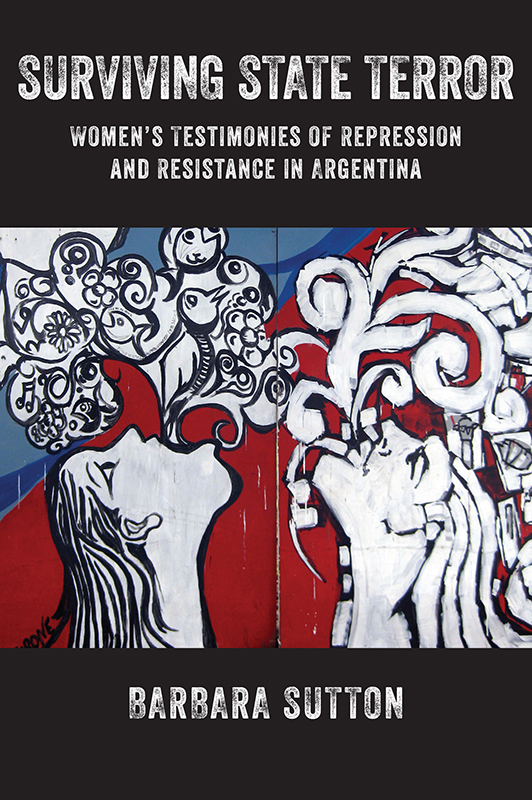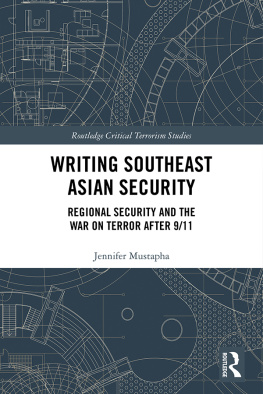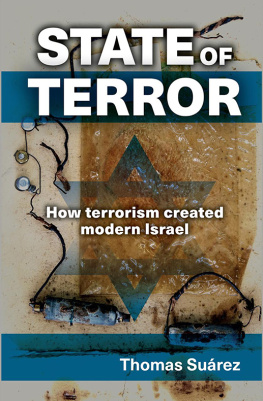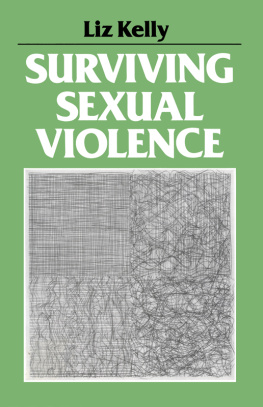
Surviving State Terror
Surviving State Terror
Womens Testimonies of Repression and Resistance in Argentina
Barbara Sutton

NEW YORK UNIVERSITY PRESS
New York
NEW YORK UNIVERSITY PRESS
New York
www.nyupress.org
2018 by Barbara Sutton
All rights reserved
References to Internet websites (URLs) were accurate at the time of writing. Neither the author nor New York University Press is responsible for URLs that may have expired or changed since the manuscript was prepared.
Library of Congress Cataloging-in-Publication Data
Names: Sutton, Barbara, 1970- author.
Title: Surviving state terror : womens testimonies of repression and resistance in Argentina / Barbara Sutton.
Description: New York : New York University Press, [2017] | Includes bibliographical references and index.
Identifiers: LCCN 2017034143| ISBN 9781479861576 (cl : alk. paper) | ISBN 9781479829927 (pb : alk. paper)
Subjects: LCSH : Victims of state-sponsored terrorismArgentina. | WomenCrimes againstArgentina.
Classification: LCC HV6433.A7 S88 2018 | DDC 323.3/4092282dc23
LC record available at https://lccn.loc.gov/2017034143
New York University Press books are printed on acid-free paper, and their binding materials are chosen for strength and durability. We strive to use environmentally responsible suppliers and materials to the greatest extent possible in publishing our books.
Manufactured in the United States of America
10 9 8 7 6 5 4 3 2 1
Also available as an ebook
Contents
Women, State Terror, and Collective Memory
The past lives in the present, and traumatic pasts still throb and ache. This is often true for individuals and societies, as memories of war, displacement, genocide, and other forms of social suffering are not easily stored away. At stake are not only the lifeworlds of people who experienced unbearable loss and unspeakable suffering, but also broader societys ability to learn, rebuild, and change. The recent history of state terrorism in Argentina is a case in point; and the survivors of this political repression have key stories to tell. This book focuses on the voices of women survivors of state-run clandestine detention centers (CDCs)a group whose perspectives have not always been heard. What might attending to these voices reveal about the nature of state violence and its relation to gender and power? What might we learn from them about survival and resistance, about collective memory and human rights?
Three decades after her captivity in one of the clandestine detentions centers of the last military dictatorship in Argentina (197683), survivor Marta Garca de Candeloro remembered a poignant lesson she learned from another former detainee called Ledda. Marta recounted the story in 2007, in the context of her testimony for the civil society organization Memoria Abierta (Open Memory). In this testimony, she wished to highlight more than horror. Although she did not remember exactly Leddas words, she offered the gist of the story:
In her testimony, Marta was apparently referring to survivor Ledda Barreiro, a woman who was detained in the same site as Marta. According to other sources, the story traces back to Leddas daughter, Silvia Muoz, who was disappeared by the regime while pregnant. As Ledda explained in one of her public appearances, the exhortation to not kill the ants wandering around in a CDC reportedly came from her daughter and was witnessed by fellow detainees who survived to tell the story.
The journey of the ants story, originally told and retold by women survivors of state terror in Argentina, encapsulates many of the themes of this book. The story itself certainly takes us directly to a place of extreme oppression, but it does not end there. Importantly, as Dori Laub (1992, 62) mentioned in relation to Holocaust survivors testimonies, this story hints to the very secret of survival and of resistance to extermination. From this story we learn about resilience, compassion, and solidarity in the midst of horror; about the power of collective efforts and the unyielding pull of freedom. That these notions become salient in the memories circulated among survivors, and then shared with the public, also speaks to the desire to draw broader lessons from experiences of unimaginable suffering and terror.
In considering how the story was retooled for a childrens audience, another important theme addressed in this study emerges: the transmission of memory, particularly to future generations. The central role of women as transmitters of collective memory and culture also becomes apparent. While oftentimes these processes of transmission stem from womens socially ascribed roles as mothers, grandmothers, or teachers passing on cultural knowledge, I would like to expand and problematize this frame. In Leddas memories of her disappeared daughter and the quest to find her grandchild, the centrality of gender-mediated family bonds is evident. However, Ledda and other women in this study have shared many other vital experiences and perspectives, including as political activists, beyond those associated with normative gender expectations.
Finally, as memories are repeated, transmitted, and resignified, variants of the ants story point to the social construction and labors of memory (Jelin 2003, 5) dedicated to keep critical insights alive. Consistent with Joan Scotts (2001) elaboration of the notion of echo, the retelling of the ants storyas well as many other stories of survivalcan create new resonances and meanings. Through echo, utterances are repeated but not exactly: repetition constitutes alteration (291). The innovations introduced through repetition prompt us to consider present investments in transmitted stories. That the ants story comes to us decades after its point of origin speaks not only to the open wounds left by the events that prompted the story but also to the lessons that contemporary societies still need to learn from these experiences.
***
During the last dictatorship in Argentina, the state armed and deployed a repressive apparatus that perpetrated massive human rights violations (CONADEP 1984; Duhalde 1999). This regime promoted a culture of fear (Corradi, Fagen, and Garretn 1992b, 1) and aimed to discipline a society with strong political concerns (DAntonio 2009, 89), persecuting with special vehemence those whose social or political activities challenged prevailing power relations. In the geopolitical context of the Cold War and leftist and popular movements that sought major societal transformationsincluding through armed strugglethe dictatorship proclaimed itself in defense of national security and Western and Christian civilization. In the name of this cause the military regime kidnapped, tortured, and disappeared a wide spectrum of people. Among these were members of guerrilla, religious, political, student, labor, and social justice organizations as well as many other people categorized as subversive. Over five hundred CDCs proliferated all over the country (Ministerio de Educacin n.d.). These were places where military, police, and security forces carried out a systematic plan of brutal repression. Women detained under the framework of subversion were disciplined using a variety of methods, including sexual violence and other gendered repertoires that intensified oppression (Auca et al. 2011; Balardini, Oberlin, and Sobredo 2011; Bacci et al. 2012; Lewin and Wornat 2014).
This book is based on oral testimonies of fifty-two women who survived CDCs during the period of state terrorism in Argentina. While repression began before the 1976 coup dtat, Memoria Abiertas Oral Archive provides public access to stories, experiences, and other information about the period of state terrorism as stated by the people directly affected by the events, literally in their own voices.
Next page







